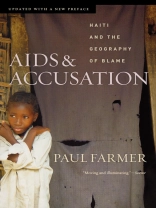Does the scientific ’theory’ that HIV came to North America from Haiti stem from underlying attitudes of racism and ethnocentrism in the United States rather than from hard evidence? Award-winning author and anthropologist-physician Paul Farmer answers with this, the first full-length ethnographic study of AIDS in a poor society. First published in 1992 this new edition has been updated and a new preface added.
Innehållsförteckning
Preface to the 2006 Edition
Preface to the First Edition
Introduction
Part I: Misfortunes without Number
2 The Water Refugees
3 The Remembered Valley
4 The Alexis Advantage: The Retaking of Kay
5 The Struggle for Health
6 1986 and After: Narrative Truth and Political Change
Part II: AIDS Comes to a Haitian Village
7 Manno
8 Anita
9 Dieudonné
10 ’A Place Ravaged by AIDS’
Part III: The Exotic and the Mundane: HIV in Haiti
11 A Chronology of the AIDS/HIV Epidemic in Haiti
12 HIV in Haiti: The Dimensions of the Problem
13 Haiti and the ’Accepted Risk Factors’
14 AIDS in the Caribbean: The ’West Atlantic Pandemic’
Part IV: AIDS, History, Political Economy
15 Many Masters: The European Domination of Haiti
16 The Nineteenth Century: One Hundred Years of Solitude
17 The United States and the People with History
Part V: AIDS and Accusation
18 AIDS and Sorcery: Accusation in the Village
19 AIDS and Racism: Accusation in the Center
20 AIDS and Empire: Accusation in the Periphery
21 Blame, Cause, Etiology, and Accusation
22 Conclusion: AIDS and an Anthropology of Suffering
Notes
Bibliography
Index
Om författaren
Paul Farmer, the Presley Professor at Harvard Medical School, is founding director of Partners In Health and Chief of the Division of Social Medicine and Health Inequalities at Boston’s Brigham and Women’s Hospital. Among his books are Pathologies of Power: Health, Human Rights, and the New War on the Poor (California, 2003).












